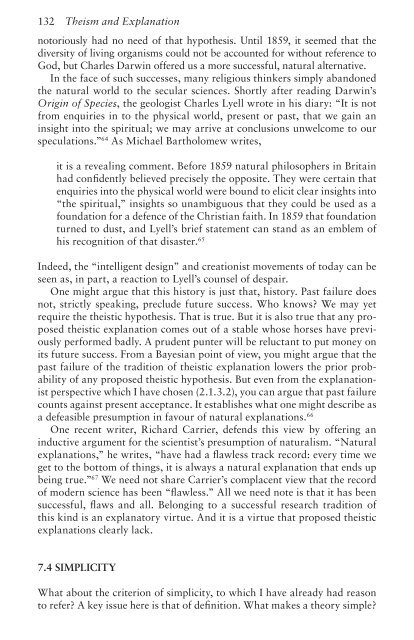Theism and Explanation - Appeared-to-Blogly
Theism and Explanation - Appeared-to-Blogly
Theism and Explanation - Appeared-to-Blogly
Create successful ePaper yourself
Turn your PDF publications into a flip-book with our unique Google optimized e-Paper software.
132 <strong>Theism</strong> <strong>and</strong> <strong>Explanation</strong><br />
no<strong>to</strong>riously had no need of that hypothesis. Until 1859, it seemed that the<br />
diversity of living organisms could not be accounted for without reference <strong>to</strong><br />
God, but Charles Darwin offered us a more successful, natural alternative.<br />
In the face of such successes, many religious thinkers simply ab<strong>and</strong>oned<br />
the natural world <strong>to</strong> the secular sciences. Shortly after reading Darwin’s<br />
Origin of Species, the geologist Charles Lyell wrote in his diary: “It is not<br />
from enquiries in <strong>to</strong> the physical world, present or past, that we gain an<br />
insight in<strong>to</strong> the spiritual; we may arrive at conclusions unwelcome <strong>to</strong> our<br />
speculations.” 64 As Michael Bartholomew writes,<br />
it is a revealing comment. Before 1859 natural philosophers in Britain<br />
had confi dently believed precisely the opposite. They were certain that<br />
enquiries in<strong>to</strong> the physical world were bound <strong>to</strong> elicit clear insights in<strong>to</strong><br />
“the spiritual,” insights so unambiguous that they could be used as a<br />
foundation for a defence of the Christian faith. In 1859 that foundation<br />
turned <strong>to</strong> dust, <strong>and</strong> Lyell’s brief statement can st<strong>and</strong> as an emblem of<br />
his recognition of that disaster. 65<br />
Indeed, the “intelligent design” <strong>and</strong> creationist movements of <strong>to</strong>day can be<br />
seen as, in part, a reaction <strong>to</strong> Lyell’s counsel of despair.<br />
One might argue that this his<strong>to</strong>ry is just that, his<strong>to</strong>ry. Past failure does<br />
not, strictly speaking, preclude future success. Who knows? We may yet<br />
require the theistic hypothesis. That is true. But it is also true that any proposed<br />
theistic explanation comes out of a stable whose horses have previously<br />
performed badly. A prudent punter will be reluctant <strong>to</strong> put money on<br />
its future success. From a Bayesian point of view, you might argue that the<br />
past failure of the tradition of theistic explanation lowers the prior probability<br />
of any proposed theistic hypothesis. But even from the explanationist<br />
perspective which I have chosen (2.1.3.2), you can argue that past failure<br />
counts against present acceptance. It establishes what one might describe as<br />
a defeasible presumption in favour of natural explanations. 66<br />
One recent writer, Richard Carrier, defends this view by offering an<br />
inductive argument for the scientist’s presumption of naturalism. “Natural<br />
explanations,” he writes, “have had a fl awless track record: every time we<br />
get <strong>to</strong> the bot<strong>to</strong>m of things, it is always a natural explanation that ends up<br />
being true.” 67 We need not share Carrier’s complacent view that the record<br />
of modern science has been “fl awless.” All we need note is that it has been<br />
successful, fl aws <strong>and</strong> all. Belonging <strong>to</strong> a successful research tradition of<br />
this kind is an explana<strong>to</strong>ry virtue. And it is a virtue that proposed theistic<br />
explanations clearly lack.<br />
7.4 SIMPLICITY<br />
What about the criterion of simplicity, <strong>to</strong> which I have already had reason<br />
<strong>to</strong> refer? A key issue here is that of defi nition. What makes a theory simple?



